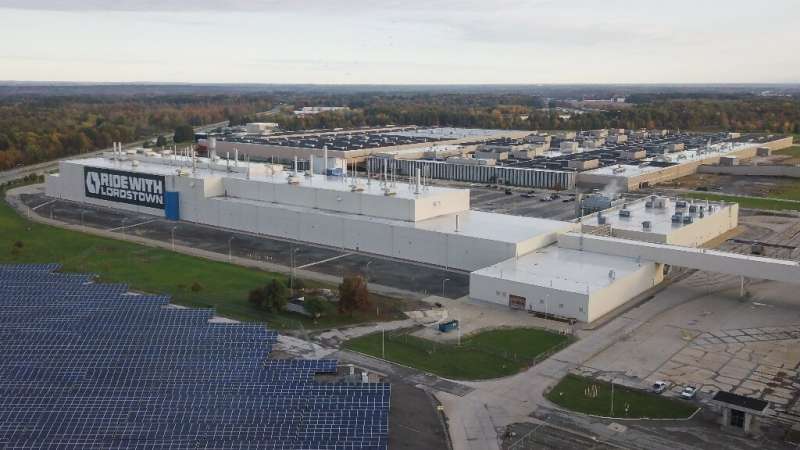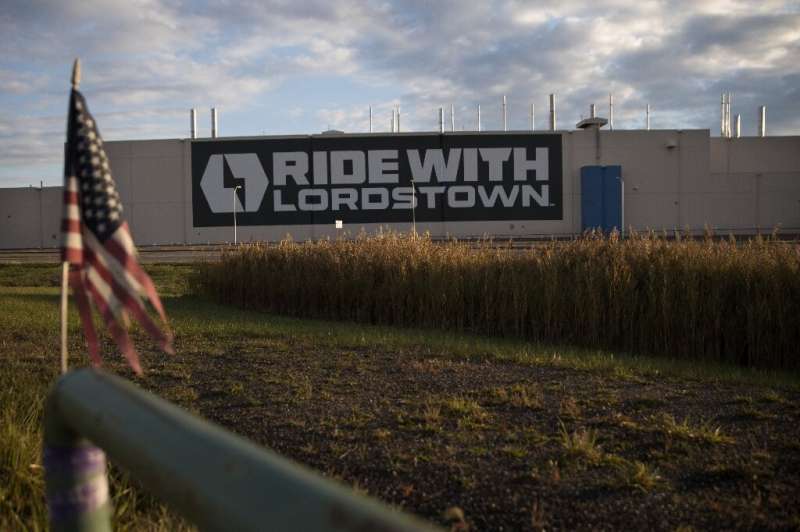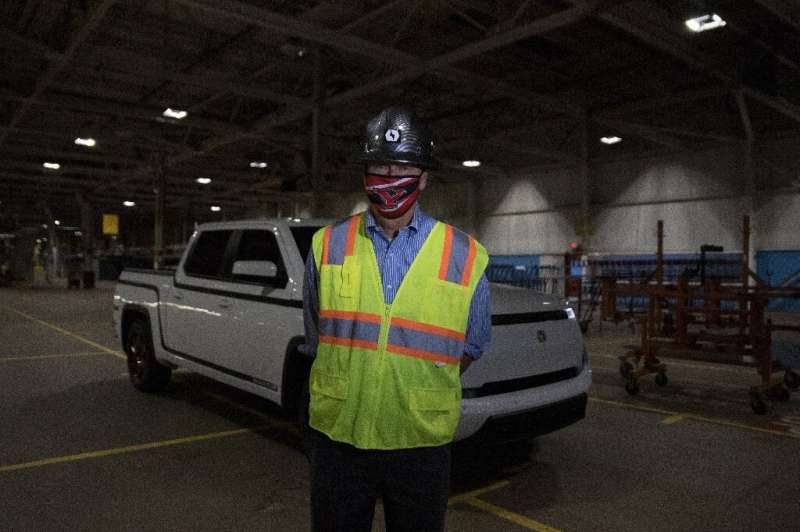The Lordstown Motors factory where GM once operated, in Lordstown, Ohio plans to begin commercial production in September 2021
Could a new Tesla-like upstart be the savior of a once-mighty Ohio steel region ravaged by deindustrialization?
Lordstown Motors has lofty ambitions for its flagship Endurance electric pickup truck to lead the way.
The new company is poised to begin trading on Nasdaq on Monday with the ticker symbol "RIDE," after shareholders on Thursday cleared a merger between Lordstown Motors and DiamondPeak Holdings.
The timing could be just right as Lordstown makes its stock market debut at a time when investors are bullish on electric autos.
The company boasts 40,000 pre-orders for the envelope-pushing Endurance, and a prototype was recently displayed at the White House.
But success is far from guaranteed. Besides the challenges of scaling any new product, analysts cite heavy competition in the electric pickup category, as well as a drag from the coronavirus crisis.
Startups always face scrutiny, but Lordstown chief executive Steve Burns expressed confidence the company would hit its targets.
"It's really turned a corner," Burns told AFP earlier this month.
GM shutdown creates opening
Burns, former chief of Workhorse Group, launched Lordstown Motors in November 2019 and acquired a plant shuttered by General Motors in March of that year.
Electric auto startup Lordstown Motors is targeting commercial production to begin in September 2021 after buying a Northeastern Ohio factory abandoned by General Motors in 2019
"This is a factory town and the factory shut down," he said. "We're not just bringing jobs, we're bringing new jobs. This is the future. Electric is the future."
The region is also home to a seasoned manufacturing workforce. The Mahoning Valley has lost more than 35,000 manufacturing jobs since 1990, according to US data.
The Endurance is a full-sized pickup, like Ford's best-selling F-150 line, and able to tow up to 7,500 pounds (3,400 kilos). It resembles conventional pickups much more than Tesla's space-age "Cybertruck."
"We wanted to have a conventional pickup, but with flair," Burns said. "If it doesn't look right, it won't sell."
One innovation in the battery-fueled vehicle is the use of motors in the vehicle's four wheels.
The pickup will retail for $52,500, which will be reduced by up to $7,500 by US tax credits.
Lordstown Motors is targeting production of 31,000 vehicles in 2022, he said.
Under the new deal with DiamondPeak, a special purpose investment vehicle, Lordstown Motors will have $675 million in financing, which Burns said is enough to enable it to reach commercial production and become cashflow positive.
White House visit
The company already has hired 200 people and should have 800 by the time it begins commercial production in September 2021, Burns said.
Steve Burns, CEO of Lordstown Motors, and the company's "Endurance" electric pickup truck in Lordstown, Ohio
The workforce could number "up to more than 2,000 hourly workers" down the road, according to a securities filing.
While the new company's arrival has been applauded, some question whether the new jobs will pay as well as the former $30-an-hour GM jobs.
The company's founder said he is open to having a union, but "we will pay competitively with or without a union."
Burns was on hand in September when the pickup was displayed at the White House. President Donald Trump, who blasted GM for closing the Ohio plant, praised the truck as "incredible." Vice President Mike Pence has visited the plant.
Officials in Lordstown said they are hopeful the Trump administration will announce before the election a massive new US Postal Service contract with Burns' former company, Workhorse, to build next generation vehicles.
Burns said he hopes Lordstown Motors will build some of the USPS vehicles for Workhorse, but that he has no information on when a contract may be announced.
But with conventional automakers, including Ford and GM, also launching electric pickups, the upstart faces competition.
"It's going to be a crowded market," said Kristin Dziczek, vice president at the Center for Automotive Research in Michigan.
The coronavirus could also delay things, warned Daniel Shoag, an economist at Case Western Reserve University in Cleveland, who noted the region has lost jobs and population during the downturn.
"When you're starting an ambitious project like this, it's not great to have the timing of major economic turmoil," Shoag said.
© 2020 AFP

























